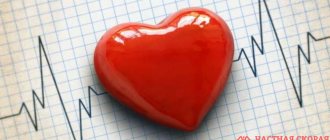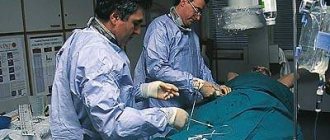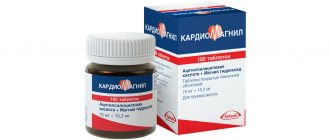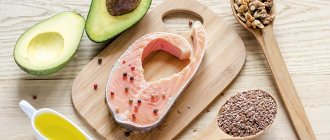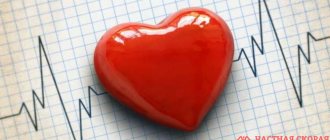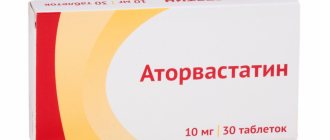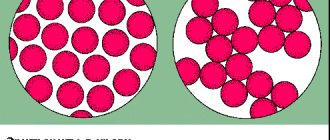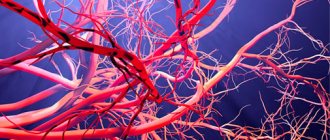Brain
The effect of caffeine on the blood vessels of the brain is specific - when ingested, caffeine leads to their narrowing. Along with the vasoconstrictor effect, caffeine also has other effects:
- accelerates metabolism locally
- stabilizes the functioning of cortical and subcortical structures
- eliminates drowsiness
- increases performance
- improves the flow of nutrients and oxygen to the brain
Heart and coronary arteries
In small doses, caffeine is beneficial for heart health because it:
- normalizes blood circulation and muscle function, which reduces the likelihood of angina, atherosclerosis and heart attack
- increases the speed of movement of the excitation wave with a weakened pulse
- increases resistance to exercise by stabilizing blood flow
- increases the flow of oxygen and nutrients due to the expansion of coronary vessels
Kidneys
Caffeine dilates the blood vessels of the kidneys, has a pronounced diuretic effect, accelerates the evacuation of waste and toxins from the body. At the same time, the alkaloid removes calcium, the deficiency of which negatively affects the health of bones, teeth, and hair. This side effect is not dangerous for people who drink no more than 2 cups of coffee per day and eat properly. After an hour, the effect of caffeine on the kidneys weakens - the blood vessels gradually narrow.
People with kidney pathologies are not recommended to abuse coffee and other caffeine-containing drinks. This reduces the risk of complications and exacerbation of chronic diseases.
Arterial pressure
The dilating effect of caffeine on blood vessels ensures an increase in the vascular lumen, which leads to an increase in blood pressure in both hypertensive and hypotensive patients. Therefore, people with fluctuations in blood pressure are not recommended to abuse caffeine-containing drinks, as the hypertensive crisis increases.
After consumption, caffeine causes an increase in the lower and upper blood pressure by 5-12 mm. Hg Art., and the effect lasts up to 4 hours. And in people who regularly take caffeine in various forms, the increase in blood pressure is insignificant.
Harm to blood vessels
In the absence of severe diseases of the cardiovascular system, caffeine has a beneficial effect on blood vessels and even 2-3 cups of caffeine-containing drinks will not cause harm to health. However, in the presence of diseases of the heart muscle and vascular system, even a small amount of caffeine can provoke pain in the heart muscle, headaches, dizziness, attacks of nausea and panic. Therefore, it is not recommended to drink caffeinated drinks for the following diseases:
- vegetative-vascular dystonia – caffeine enhances the symptoms and provokes the appearance of causeless anxiety and increased anxiety;
- hypertension – coffee causes an increase in blood pressure, which significantly worsens the general condition of the patient and can lead to a hypertensive crisis;
- myocardial damage with pain and heaviness in the area of the heart muscle, which are associated with a deficiency of potassium, calcium, magnesium, which are washed out with excessive consumption of coffee and other caffeinated drinks;
- angina pectoris and tachycardia, in which caffeine increases their symptoms and provokes complications;
- vascular aneurysm - caffeine has a destructive effect on the vascular walls and can provoke hemorrhage;
- glaucoma - an alkaloid aggravates the course of the disease, as it increases intraocular pressure.
What vessels are there in the human body
The circulatory system consists of the heart and several types of vessels. They differ in structure and inherent functions, and damage has different consequences.
| Vessel type | Walls | Functions |
| Arteries |
| Transfer of blood from the heart to the organs. |
| Vienna |
| Return of blood from organs to the heart. |
| Capillaries |
| Connection of veins and arteries with organs for the exchange of nutrients. |
Veins and arteries are not easily damaged. This requires a strong mechanical impact, leading to external or internal bleeding. We do not always notice capillary injuries, since they only cause subcutaneous hemorrhage. This manifests itself through hematomas (in other words, bruises).
Vitamins that help strengthen capillaries
There are many beneficial substances that have a beneficial effect on the health of the circulatory system. The vascular epithelium is best strengthened by vitamins of the following groups:
- A (found in carrots, beef liver, fish, broccoli, cheese, apricots, melon);
- B (can be found in milk, kidneys, eggs, herring, cereals);
- C (citrus fruits, greens, rose hips, sea buckthorn, cabbage, tomatoes are rich in it);
- K (consumed from prunes, cucumbers, olive oil, asparagus, cayenne pepper).
Vitamins E and PP also help improve the condition of blood vessels in general. Their action is aimed primarily at normalizing lipid metabolism. If you cannot get the required amount of nutrients from food, you can get them from medications.
How to improve the condition of blood vessels using folk remedies
Folk remedies can become a measure to prevent fragility and have a strengthening effect. Common decoctions and tinctures are:
- from rose hips, motherwort herbs, dried herbs and meadowsweet;
- from heads of garlic and lemon;
- from barberry (you can take both branches and roots);
- from buckwheat flowers;
- from rosehip and hawthorn;
- from cranberries and garlic.
There are many options for preparing them (they mainly differ in proportions). The main thing is the ingredients.
If you don’t want to prepare an infusion, natural teas are enough. Green, anise or any other leafy one helps not only strengthen, but also cleanse blood vessels. Cabbage leaf compresses are also useful. It needs to be applied locally - to places where the capillaries are already damaged.
Coffee and oncology
There is a myth that coffee causes cancer. However, the World Health Organization's International Agency for Research on Cancer notes that there is no substantiated evidence for this claim. Although coffee does contain a carcinogen - acrylamide. However, the same substance is found in potatoes, potato chips, hot toast, and even breakfast cereals.
Researchers note that very hot drinks may be carcinogenic. As a rule, these are those whose temperature exceeds 65 degrees. The fact is that when they get inside a person, they are able to destroy the cells of the esophagus and act as a catalyst for tumors. However, this is just data from one of the studies and food for thought for lovers of very hot coffee. Traditionally, coffee is served at a temperature of 60-75 degrees. If the drink burns your lips, it would be advisable to cool it slightly.
Despite this, in the spring of 2021, a California court ordered American coffee producers to label their coffee containing carcinogens. Even the well-known company “Starbucks” could not prove to the court that the substance formed during coffee roasting does not increase the risk of developing cancer.
Although the result of one study, which involved scientists from Italy, Great Britain and the USA, on the contrary, proved that moderate coffee consumption is associated with a reduced risk of breast, colon, endometrial and prostate cancer. Also, thanks to its use, there is a possibility of reducing the risk of developing Parkinson's disease and type 2 diabetes. Moreover, scientists have concluded that coffee can even be part of the diet.
Treatment
Treatment of vascular spasms of the extremities directly depends on the stage of the vascular disease. With initial symptoms, you must immediately give up bad habits and reconsider your diet. At the stage of conservative treatment, medications and physiotherapy (metered walking, physical therapy, lymphatic drainage) are used. The main medications for vascular spasms in the legs: sulfonamides, analgesics, glucocorticosteroids.
The goal of treatment is to remove spasm of blood vessels in the legs and arms, reduce blood viscosity, and protect the artery walls from damage. For this, a complex of blockades and antihistamines are used.
The course of treatment is carried out several times a year, some drugs must be taken on an ongoing basis.
In case of large areas of damage, surgical methods are used:
- installation of an alloprosthesis (replacement of part of a blocked vessel);
- shunting (redirecting blood flow around the damaged area);
- removal of atherosclerotic plaque.
In rare cases, with the development of gangrene and necrosis, the limb is amputated.
Composition and action
The main component in the composition is caffeine. The component has the peculiarity of having a psychostimulating effect on parts of the nervous system.
The effect of aromatic potion on the body
It has been proven that coffee, if consumed in moderation by people without contraindications, has a positive effect:
- increases mental activity;
- improves a person’s mood;
- enhances performance;
- reduces irritability.
A similar effect is achieved not only thanks to caffeine, but also other necessary components:
- carbohydrates;
- fats;
- oils;
- potassium;
- manganese;
- iron;
- magnesium.
Fact! Caffeine belongs to the methixanthine group of alkaloids. Such substances can have a doping effect, significantly reducing the human body’s need for rest, while increasing its performance. The action is achieved through psychostimulation of the cerebral cortex.
Roasted grains.
As a result of an overdose, the opposite effect appears - the process of transmission of nerve impulses by cells is slowed down. The photo shows high-quality coffee beans from which you can prepare a drink that will benefit the cerebral vessels. After consuming acceptable doses, the breathing process becomes more frequent and the functional activity of the heart and blood vessels changes.
Coffee has an effect on all organs and systems of the body:
- respiratory;
- digestive;
- endocrine;
- metabolic process;
- heartbeat;
- vascular tone.
The active component is present not only in the grains, but also in the leaves. That is why the effect of caffeine on cerebral vessels should be examined in detail. Read the article to the end to find out whether coffee dilates or constricts blood vessels in the brain.
Benefit or harm?
Daily dose
In order for the effect of coffee on the blood vessels of the brain to be only positive, it is important to follow the rules for its use. There is definitely an acceptable daily dose that provides benefit.
Do not exceed permissible limits
Excessive consumption of caffeine-containing products will be harmful and cause the following disorders:
- exhaustion of the nervous system;
- disturbances in the functioning of the cardiovascular system;
- heart rhythm disturbances;
- decreased brain activity;
- intoxication.
Proven! The lethal dose of caffeine is 10 grams per day. Depending on the strength - more than 10 liters of drink. Based on this information, it should be concluded that death from overdose is rare. It is simply impossible to drink such a volume; first of all, the body’s protective reaction – the gag reflex – will work.
The daily intake of caffeine is no more than 600 mg. This volume should be divided into several doses. It is permissible to consume no more than 6 mugs with a volume of 150 ml per day.
However, it should be remembered that such a dose affects the functioning of the heart, therefore, in case of tachycardia and other pathologies, the volume must be significantly reduced. Instructions for use must be followed by everyone; excessive consumption of caffeine does not benefit even a healthy body.
The consumer's attention should be focused on the fact that benefits can only be obtained from a natural product. Its price is certainly higher, but only such a composition can be beneficial. Granulated or freeze-dried coffee goes through many stages of processing, including exposure to extremely low temperatures, during which it loses its original properties.
The beneficial properties are lost during the preparation of granules.
Coffee can dilate the blood vessels of the heart muscle if its concentration exceeds 50 mg; if consumed in smaller doses, the effect will be unnoticeable. Long-term use of the drink can cause addiction.
Daily intake
It is more correct to indicate the daily intake not of coffee, but of the caffeine it contains. How much is there in a regular cup of hot drink?
You can focus on the following numbers:
- soluble - from 60 to 100 milligrams (at the rate of 2 teaspoons of granules);
- espresso – from 80 to 130 milligrams;
- cappuccino (lattes and other similar drinks) – from 40 to 70 milligrams;
- natural boiled (in the traditional way in Turk) - from 110 to 170 milligrams.
The optimal daily intake is up to 200 milligrams of caffeine , that is, 2 regular cups of coffee. The permissible maximum is 400 milligrams.
If it is more, it will harm the heart, as there will be an excessive load on it. For children under 14 years of age, coffee drinks in any form are generally not recommended (this also applies to pharmacological preparations that contain caffeine).
In theory, if you follow these recommendations, there will be no negative consequences from drinking coffee. This has been confirmed by many years of research (when scientists wanted to find out whether the life expectancy of those who prefer tea and those who drink only coffee changes).
Ground or instant?
Ground coffee is roasted and then ground natural coffee beans. Instant is cooked in different ways, but sublimation (drying at low temperature in a vacuum) is considered the highest quality. However, this is an expensive pleasure and instead of granules as with sublimation, the coffee is simply dried. This is exactly the kind of coffee we are used to seeing on supermarket shelves in the form of aromatic dry powder.
There are opinions that coffee beans are healthier. After all, unscrupulous manufacturers' instant coffee may contain additional impurities (for example, substances that increase shelf life).
However, some experts believe that instant coffee is no different from ground coffee. After all, it’s purely a matter of production technology: the coffee beans are ground and dehydrated. Therefore, the only difference between coffee beans and instant coffee is the caffeine content. On average, in a cup of instant coffee, depending on the type, the caffeine content is in the range of 60-80 mg, freshly ground - 60-120 mg.
Did you know that Luwak coffee is considered the most expensive type of coffee? Musang, the Malayan palm marten, is involved in its production. The most delicious coffee drink with a chocolate-caramel flavor is obtained from the excrement of this animal: the animal eats only coffee beans.
Coffee and teeth
Coffee causes darkening of the enamel. Unfortunately, this is not a myth, but a reality, as many dentists will agree. However, this only happens if there are microcracks in the teeth. But even if you drink a drink through a straw, trying to protect your teeth, contact cannot be avoided. Therefore, there is no point in being sophisticated.
It is also true that drinking coffee with sugar contributes to the destruction of tooth enamel. Sweet foods provoke the accumulation of pathogenic microbes, which accelerates the process of plaque formation. I also don’t recommend combining coffee with ice cream. It is from the combination of hot and cold that microcracks can appear on the teeth.
For those who have already decided to brush their teeth immediately after drinking coffee, it is better not to do this. Hot drinks soften tooth enamel, making it easier to damage during brushing.
By the way, Italian scientists have proven that roasted coffee has high antibacterial properties and protects the oral cavity from bacteria of the genus Staphylococcus aureus and Streptococcus mutans. According to this characteristic, even green tea is inferior to the drink. So, to avoid dental problems, it is enough to visit the dentist regularly and take care of your oral cavity.
